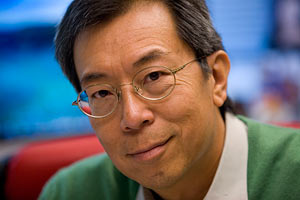Robert Tjian to head Howard Hughes Medical Institute
| 30 September 2008
BERKELEY — University of California, Berkeley, molecular biologist Robert Tjian is the newly elected president of the Howard Hughes Medical Institute (HHMI), one of the world's largest private funders of biomedical research.
 Robert Tjian (©2008 Barbara Ries)
Robert Tjian (©2008 Barbara Ries)"It's an exciting opportunity," said Tjian, a UC Berkeley professor of molecular and cell biology and director of the Berkeley Stem Cell Center. "I think that the head of HHMI is one of the most influential positions that a scientist can have in terms of helping set the direction and policy of the educational and research program in the United States, and probably internationally."
Tjian, who has been an HHMI investigator since 1987, added, "I feel a sense of responsibility after more than 20 years as an investigator with the institute. It is a great chance to give back, and a huge honor to be asked."
"Bob Tjian has been a true force of nature in the life sciences here at Berkeley through both his own research and his dynamic leadership," said UC Berkeley Chancellor Robert Birgeneau. "He has been an invaluable colleague during my time as chancellor. I have no doubt that he will be a great president of HHMI."
In announcing the election on Tuesday, Sept. 30, Hanna H. Gray, chairman of the HHMI trustees and head of the committee that conducted the search for a new president, noted that "Dr. Tjian is not only a distinguished and productive scientist, but also a committed teacher and mentor of young scientists."
"He is known as a person of impeccable taste in science who commands a great breadth of understanding across the life sciences," said Gray. "We very much look forward to working with Dr. Tjian as he and his colleagues explore the ways by which HHMI can support first-rate scientists and their most promising initiatives."
"The HHMI has really made a terrific choice," said Tjian's friend and colleague Michael Botchan, professor and co-chair of UC Berkeley's Department of Molecular and Cell Biology. "(Tjian) really embodies all the qualities an institution like the HHMI needs in a leader."
As Botchan pointed out, HHMI has led the way in some areas, such as stem cell research, where public funding agencies such as the National Institutes of Health (NIH) have had their hands tied by political decisions from the White House.
"In many ways, the president of HHMI has more individual authority and ability to help medical research in the U.S. than even the director of NIH," Botchan said.
Tjian agreed. "HHMI has a much longer view of things, and can fund the science that makes sense. And HHMI's goal is not to fund projects, but to fund people. They have the capacity and mechanism to go and identify the best 300 or so investigators in the whole country and then fund them quite generously, and leave them alone to do risky, high-impact research that really puts the U.S. on the cutting edge. We need a lot more of it."
Tjian will succeed Nobel Laureate Thomas R. Cech, who received his Ph.D. in1975 from UC Berkeley and who has served as HHMI's president since January 2000. Cech announced his decision to step down from the presidency earlier this year in order to return to full-time research and teaching at the University of Colorado at Boulder.
"The HHMI has been wonderfully fortunate in its leaders, and we are delighted that Bob Tjian will be continuing that tradition as he builds on the outstanding achievement that has marked Tom Cech's presidency," Gray said.
Tjian is known for his research tracking down the proteins that regulate the transcription of genes into RNA, the blueprint for production of proteins. His laboratory has illuminated the relationship between disruptions in the process of transcription and human diseases such as cancer, diabetes and Huntington's. More recently, he has begun studying how transcription factors control the differentiation of embryonic stem cells into muscle, liver and neurons.
Tjian plans to continue to run his UC Berkeley laboratory, while moving a small portion of his research to Janelia Farm, HHMI's relatively new research campus in rural Ashburn, Va. He already collaborates with a small team of visiting scientists at Janelia Farm on a project to develop new approaches that will allow them to image biochemical activities in single living cells.
Tjian, a native of Hong Kong, obtained his B.S. in biochemistry at UC Berkeley in 1971, his Ph.D. from Harvard University in 1976 and, after a post-doctoral fellowship with Nobelist James Watson at the Cold Spring Harbor Laboratory in New York, joined the UC Berkeley faculty in 1979. He has served in many leadership roles on campus, in particular for the Health Sciences Initiative campaign to raise money for a broad range of biomedical and health science research. Fruits of that effort are the new Stanley Hall, completed last year as a site for multidisciplinary biomedical research, and the Li Ka Shing Center for Biomedical and Health Sciences, which is now under construction and will house the campus's stem cell center and the Helen Wills Neuroscience Institute.
Tjian "has made extraordinary contributions to our lives here at Cal and internationally as a teacher, scientist and colleague to so many people. His efforts here are going to be less, but his heart is still going to be in Berkeley. His lab here will continue to be one of the jewels in the crown here in the life sciences at Berkeley," Botchan said.
Tjian is a member of the National Academy of Sciences and has received many awards honoring his scientific contributions, including the Alfred P. Sloan Prize from the General Motors Cancer Research Foundation and the Louisa Gross Horwitz Prize from Columbia University. He was named California Scientist of the Year in 1994.
Tjian and his wife, Claudia, an attorney, have two daughters and live in Berkeley.

